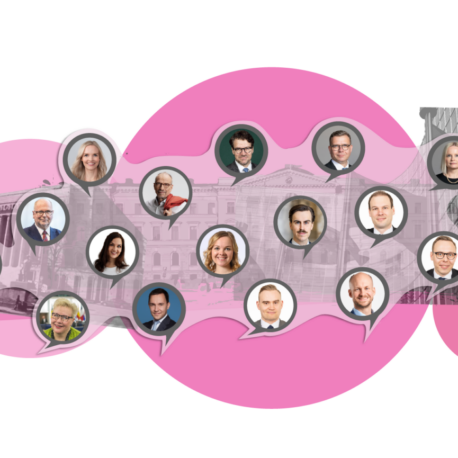
As of 2024, Finnish law will require us lobbyists to make our work more transparent and public. In the future, we must submit a record of our parliamentary and ministerial lobbying activities to the statutory transparency register in the Avoimuusrekisteri.fi web service.
At Finance Finland, we have been publishing a report of our lobbying activities on our own website since 2020 – entirely of our own volition, without being decreed to do so by lawmakers. In the report of our lobbying activities, we disclose the names of the political decision-makers we have lobbied in our key priorities. Our latest report can be read here.
Although we were already disclosing our lobbying activities, we stood firmly in favour of the transparency register because we believe that as long as the process of lobbying is not easy to see through, its name will remain tarnished. This is why I consider it wise that in the future, all organisations, corporations and lobbying agencies will have common rules that oblige them to disclose their lobbying activities.
Over the course of the statutory transparency register’s preparation, concerns have been voiced about the new legislation causing participation in society to decline. This is not the way I see it. Instead, my hope is for the transparency register to solidify a notion of lobbying as an integral part of democracy, which might encourage more and more organisations and corporations to take part in social debate and carry out lobbying activities.
I trust that the statutory transparency register will help demystify lobbying, making it more open and easier to understand. For us lobbyists, there is also the added value of our work gaining more visibility and recognition.
======
I trust that the statutory transparency register
will help demystify lobbying.
======
There is no denying that the transparency register will increase the administrative burden of lobbyists, but hopefully not too much. Even the law dictates that the technical implementation for submitting the biannual online report must be lightweight and user-friendly.
Limiting the scope of application to the Parliament and the ministries helps lighten the administrative burden as contact with government offices and other government operators does not have to be reported. Grassroots civic engagement is also left outside the scope of the register, as is the low-impact lobbying of most small associations.
My hope is that the statutory transparency register will commit lobbyists and open up opportunities for creating common rules, including recommendations for good lobbying. For this purpose, the National Audit Office of Finland (NAOF) has appointed an advisory board, which represents a wide variety of register users, including authorities, researchers and representatives of those subject to the reporting obligation.
Transparency will open doors
The statutory transparency register will make the legislative footprint of decisions and legislative proposals public, showing who has sought to influence them and how. Different interest groups must have equal opportunities to influence matters and make their voices heard.
I can say out of personal experience that practicing transparency does not cause decision-makers to close their doors from lobbyists. Most politicians think that it is wise to listen to the viewpoints of multiple interest groups and experts before making a decision. Of course, responsible decision-makers do not outsource their decisions, either; they take responsibility for and have the last word on them.
I am proud to see the steps that are now being taken in lobbying towards greater transparency and common rules. Secretive dealings are a thing of the past.
Tuomo Yli-Huttula
Chair of the Advisory Board for the Transparency Register of the National Audit Office of Finland
Chair of the Edunvalvontafoorumi, a network of Finnish lobbyists
Director of Public Affairs at Finance Finland
Finance Finland already annually publishes a report of its lobbying activities, disclosing the names of the political decision-makers it has lobbied in its key priorities. The reports have been published since 2020.
In a series of four columns, Tuomo Yli-Huttula discusses why Finland needs a statutory transparency register and why he has been lobbying for the register for seven years.
Avoimuusrekisteri.fi service launched on 1 January 2024
- The goal is to increase the openness and transparency of lobbying by obligating legal entities and sole proprietors to report all their lobbying activities and professional lobbying consultation targeted at the Parliament or the ministries.
- The scope of application is limited to the Parliament and the ministries, who are the primary targets of lobbying due to their position in the legislative and budgeting processes.
- Low-impact lobbying will be left outside the scope of the register, as will grassroots civic engagement and the activity of private persons.
- Lobbying activity is to be reported at the individual level, disclosing the names of the members of parliament, ministers, state secretaries, special advisers, permanent secretaries, under-secretaries, director generals and rapporteurs. Personal assistants and other staff of parliamentary groups are reported only in terms of their parliamentary group, without disclosing personal identifying information. Contact with other ministry officials is reported only at the level of their department and unit.
- The entities subject to the reporting obligation are required to submit a report twice a year. Each report must be submitted during its respective reporting period: the first period lasting from 1 January to 28 February, and the second lasting from 1 July to 31 August. The reported information must include who was contacted, what topics were discussed and what the primary means of contact were. In addition, an estimate of the financial resources used in lobbying activity must be reported once a year.
- The information submitted to the register is published in the Avoimuusrekisteri.fi service. Retrieving data from the register is free of charge.
- The registration authority in charge is the National Audit Office of Finland (NAOF), which is tasked with instructing the entities subject to the reporting obligation as well as with preparing detailed guidelines for the use of the service.
- The NAOF has set up an advisory board, whose role is to draw up and maintain recommendations for good lobbying and act as an official body of cooperation for the stakeholder groups related to the regulation. The advisory board began its work in May 2023.
Still have questions?
|Contact the columnist
Looking for more?
Other articles on the topic

New recommendations for good lobbying practice promote a responsible lobbying culture in Finland – Finance Finland is committed to the ethical guidelines

Finance Finland is committed to open lobbying – The 2023 transparency report covers lobbying activities in Finland and Brussels

Home is where the EU is – it’s time to roll up our sleeves and solidify our place at the heart of the Union

EU membership is part of Finland’s political and economic identity – and Finland is looking to take a more active role




